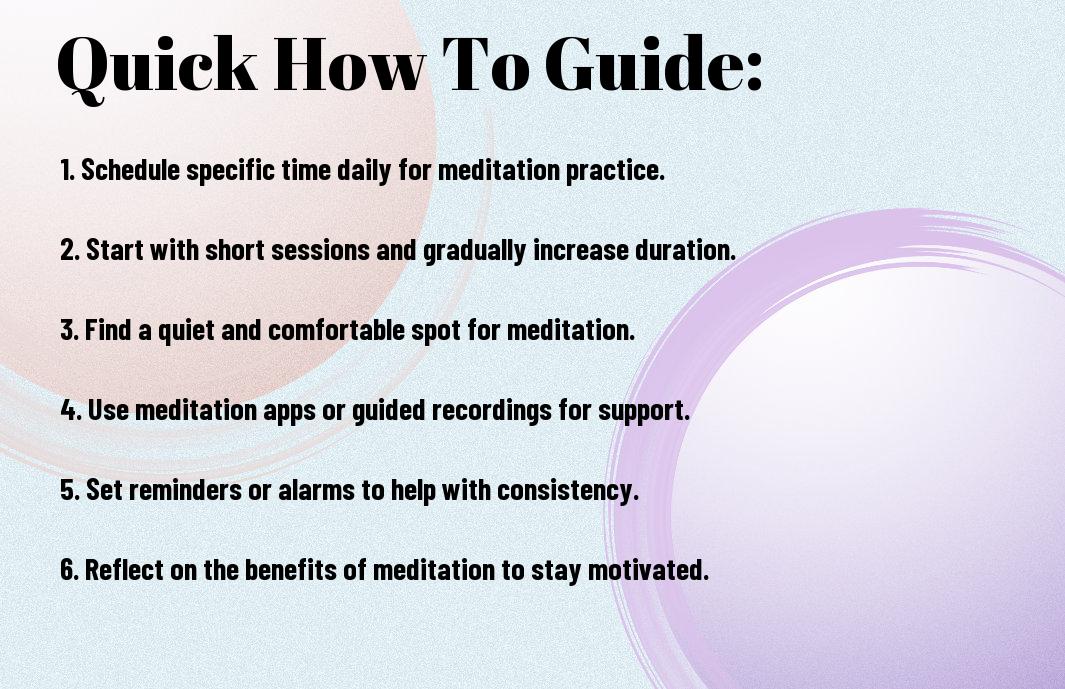Verily, incorporating meditation into your daily routine can be a transformative practice with numerous benefits for your mental and physical wellbeing. However, establishing a regular meditation habit can be a challenge that many people struggle to overcome. In this post, I will share with you five effective strategies for making meditation a consistent part of your daily life. By implementing these tips, you can develop a sustainable meditation habit that will bring lasting positive changes to your life.
Key Takeaways:
- Consistency is key: Making meditation a habit requires consistent practice. Set aside a specific time each day for meditation to build a routine.
- Start small: Begin with just a few minutes of meditation each day and gradually increase the duration as it becomes a regular practice.
- Find what works for you: There are various forms of meditation, such as mindfulness, guided meditation, and loving-kindness meditation. Experiment with different techniques to find the one that resonates with you and makes it easier to stick to the habit.

How-to Tips for Creating a Meditation Routine
If you want to build a meditation routine, there are several steps you can take to make it happen. Here are some tips to help you develop a consistent meditation practice:
- Set a specific time for your meditation practice each day, and stick to it.
- Choose a quiet and comfortable place to meditate where you won’t be interrupted.
- Start with just a few minutes of meditation each day, and gradually increase the duration as it becomes a habit.
- Use guided meditation sessions to help you stay focused and motivated.
- Keep track of your progress by journaling about your meditation practice and any insights or changes you notice.
Knowing these simple tips can help you establish a regular and effective meditation routine.
Finding the Right Time and Place
When it comes to developing a meditation routine, finding the right time and place is crucial. Choose a time of day when you can commit to your meditation practice without distractions. It’s also important to create a soothing and comfortable space where you can focus on your meditation without interruptions. By finding the right time and place for your meditation practice, you can set the stage for a successful routine.
Using Meditation Apps for Guidance
In today’s digital age, there are numerous meditation apps available that can provide guidance and support for your meditation practice. These apps offer a variety of meditation techniques, guided sessions, and mindfulness exercises to help you cultivate a regular meditation routine. They can also track your progress, offer reminders, and provide access to a community of like-minded individuals. Utilizing a meditation app can be an excellent way to stay inspired and motivated on your meditation journey.
Factors that Influence Consistency in Meditation
However, there are several factors that can influence how consistent you are with your meditation practice. These factors can have a significant impact on your ability to incorporate meditation into your daily routine:
- Personal Motivation: The desire to improve your mental and physical well-being can greatly influence your commitment to meditation.
- Environment: Finding a quiet and peaceful space to meditate can make it easier to focus and stay consistent.
- Support System: Having the encouragement and support of friends or family members can help maintain your commitment to meditation.
- Overcoming Challenges: Recognizing and addressing common obstacles can help you stay on track with your meditation practice.
- Educational Resources: Access to educational resources and information about the benefits of meditation can motivate you to maintain a regular practice.
This understanding of the factors that influence consistency in meditation can help you make informed decisions about how to incorporate meditation into your daily life.
The Role of Personal Motivation
The level of motivation you have to improve your overall well-being can greatly impact your commitment to a regular meditation practice. Focusing on the positive changes you can experience as a result of meditation can help you stay dedicated to your practice.
Overcoming Common Challenges
While there may be challenges in establishing a regular meditation practice, it’s important to recognize and address them head-on. Developing strategies to overcome these obstacles can help you maintain consistency in your practice.
Incorporating Meditation into your Daily Life
After learning about the benefits of meditation and deciding to make it a habit, the next step is to find ways to incorporate it into your daily routine. This can be challenging, especially with a busy schedule, but with a little effort and creativity, you can make it a regular part of your life.
How-to Use Micro-Meditations
One effective way to incorporate meditation into your daily life is by practicing micro-meditations. This involves taking short, intentional moments throughout your day to pause, breathe, and center yourself. It could be as simple as taking a few deep breaths before starting a task, or closing your eyes and focusing on your breath for a few minutes during a break. By incorporating these micro-meditations into your routine, you can reduce stress, increase focus, and cultivate a sense of calm throughout your day.
Making Meditation a Priority
Making meditation a priority means carving out time for it in your schedule just like any other important task. This might mean waking up a little earlier to meditate before the day gets busy, or setting aside time in the evening to unwind and relax. By making a conscious effort to prioritize meditation, you are acknowledging its importance and making a commitment to yourself to nurture your mental and emotional well-being. With this mindset, you are more likely to stick to your meditation routine and reap the benefits.
Cultivating a Healthy Attitude towards Meditation
Your attitude towards meditation plays a crucial role in making it a habit. I believe that adopting a positive and open mindset is the key to cultivating a healthy attitude towards meditation. This involves approaching meditation with curiosity and non-judgment, and being open to the experience without setting specific expectations. By embracing a mindset of acceptance and openness, you can create a sustainable meditation practice.
Tips for Maintaining a Positive Mindset
To maintain a positive mindset towards meditation, I recommend implementing the following tips:
- Practice self-compassion: Be kind and gentle with yourself, especially when your mind wanders during meditation. It’s natural, and it’s part of the practice.
- Focus on the present moment: Instead of getting caught up in thoughts about the past or future, try to anchor yourself in the present moment during meditation.
- Engage in gratitude: Before or after your meditation session, take a moment to reflect on what you’re grateful for. This can help shift your mindset towards positivity.
Knowing that meditation is a journey and embracing the process, rather than fixating on specific outcomes, is crucial for maintaining a positive mindset.
Rewarding your Consistency
Consistency is essential in establishing a meditation habit. To reward your consistency, I suggest acknowledging and celebrating your efforts. Whether it’s through setting small goals and milestones for your meditation practice or treating yourself to something you enjoy after each session, finding ways to reward your consistency can reinforce the habit. By recognizing and celebrating your dedication to meditation, you can reinforce a positive association with the practice, making it easier to maintain as a habit.
5 Ways to Make Meditation A Habit
Considering all points, I hope you find these suggestions helpful in making meditation a regular part of your daily routine. By setting a specific time and place, starting small, finding a meditation style that works for you, using reminders, and being kind to yourself, you can build a consistent meditation practice that will have numerous benefits for your mental and physical well-being. Remember, like any habit, it takes time and dedication, but the rewards are well worth it. I encourage you to start implementing these tips and see the positive impact it can have on your life.
FAQ
Q: What are the benefits of making meditation a habit?
A: Making meditation a habit can lead to reduced stress, improved focus and concentration, better emotional regulation, increased self-awareness, and overall better mental and emotional well-being.
Q: How can I make meditation a habit?
A: To make meditation a habit, start by setting aside a specific time each day for meditation, even if it’s just a few minutes. Create a dedicated space for meditation, eliminate distractions, and be consistent with your practice. It also helps to start with short sessions and gradually increase the duration as you become more comfortable with the practice.
Q: What are some tips for staying consistent with meditation?
A: To stay consistent with meditation, consider incorporating it into your daily routine, such as meditating first thing in the morning or before bed. Use reminders or alarms to prompt you to meditate, and hold yourself accountable by tracking your progress. Additionally, finding a meditation buddy or joining a meditation group can provide additional motivation and support for maintaining the habit.

